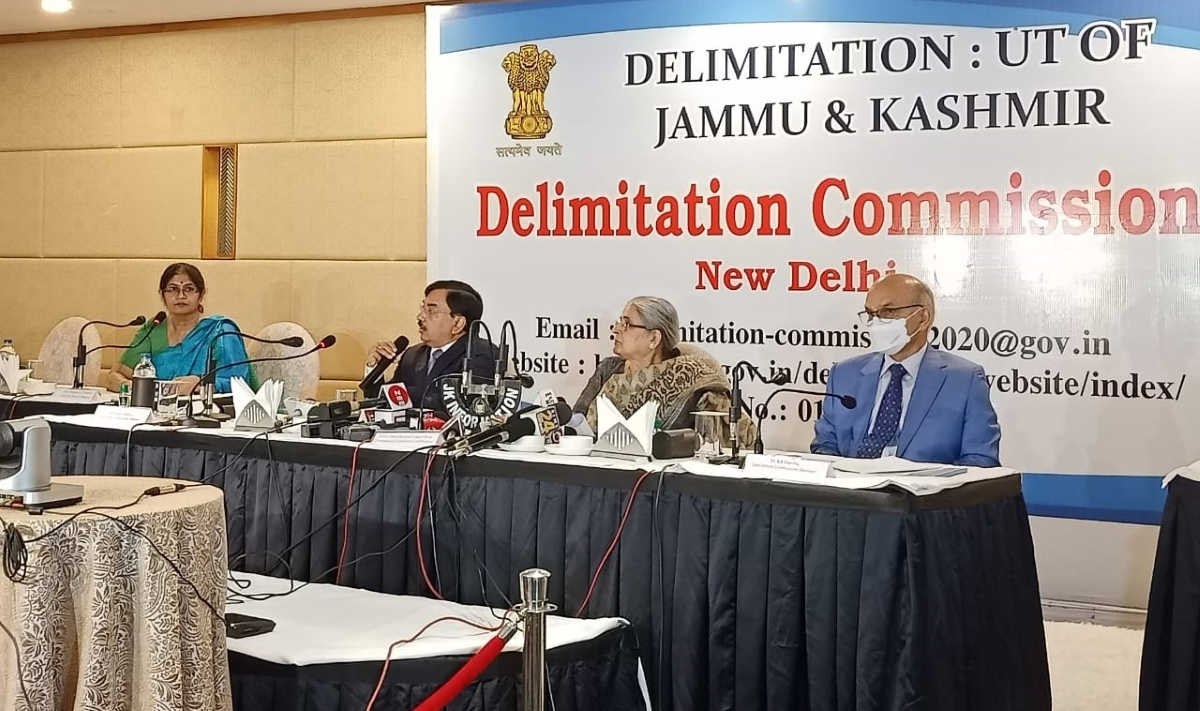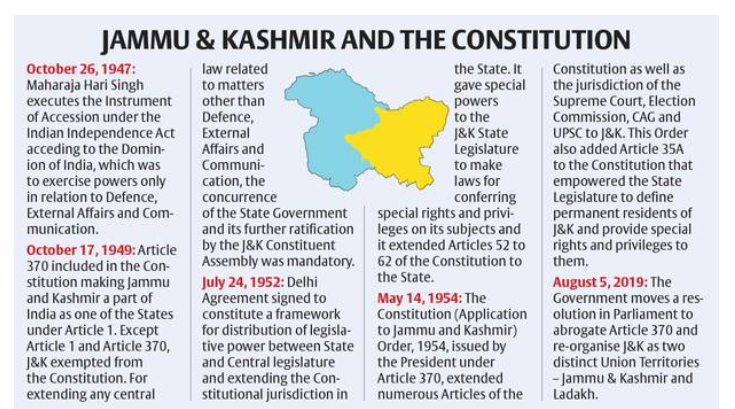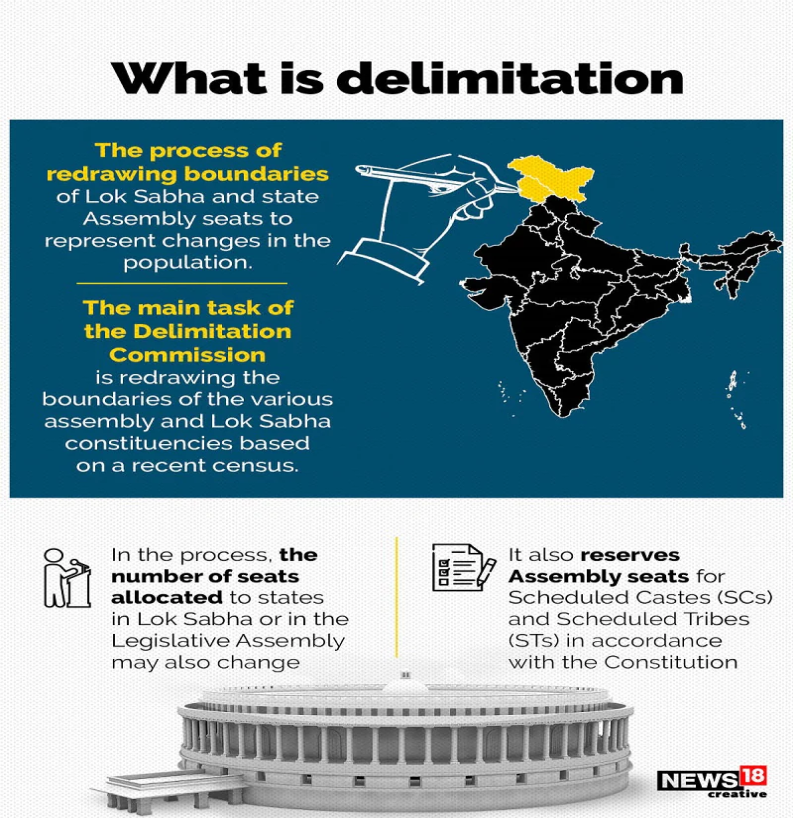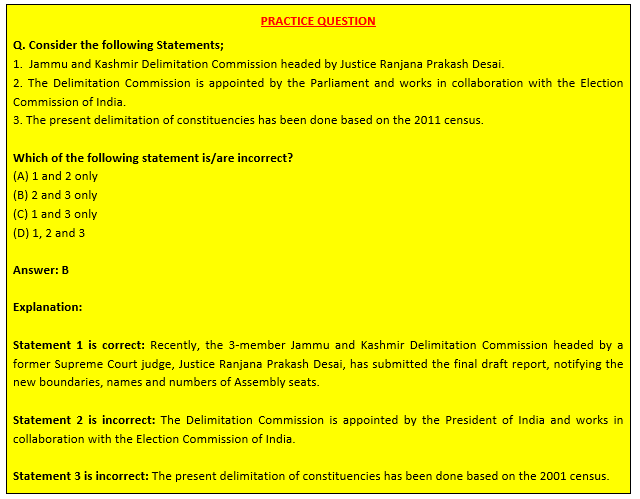J&K DELIMITATION PANEL

Copyright infringement not intended
In News
- The Supreme Court of India has rejected the petition that challenged the constitution of the Jammu and Kashmir Delimitation Commission to readjust constituencies.
- The Court stated that Articles 2 and 3 of the Indian Constitution enable the Parliament to create new States and Union territories.
Details
- The Supreme Court has rejected the petition and highlighted that “Once the Delimitation Commission was established, there is nothing wrong if the central government extended the period of appointment of the Chairperson till the task of delimitation/readjustment was completed,”.
- The petition questioned why the delimitation of J&K has been initiated when Article 170 of the Constitution said that such an exercise for the entire country was due only in 2026.
- The petitioners had argued that only the Election Commission of India, under Section 60 of the 2019 Act, was empowered to conduct the delimitation exercise.
- The petition argued that the Centre had seized the jurisdiction of the Election Commission of India by notifying the delimitation of J&K.
- The petitioners had argued that only the Election Commission of India, under Section 60 of the 2019 Act, was empowered to conduct the delimitation exercise.
- The Supreme Court said that the J&K Reorganization Act which created the two new Union territories assigns the role of readjustment of constituencies to the Delimitation Commission under the Delimitation Act, 2002… a law made under Article 3 can always provide for readjustment of the Constituencies in the newly constituted States or Union territories through the Delimitation Commission.
Delimitation Commission for the Jammu and Kashmir
- Recently, the 3-member Jammu and Kashmir Delimitation Commission headed by a former Supreme Court judge, Justice Ranjana Prakash Desai, has submitted the final draft report, notifying the new boundaries, names and numbers of Assembly seats.
- The Delimitation report has added 6 Assembly seats to Jammu, 1 to Kashmir, and redrawn Assembly as well as Lok Sabha seats.
- Out of the 90 Assembly Constituencies in the region, 43 will be part of the Jammu region and 47 of the Kashmir region.
- Under the draft published, some villages in one constituency are surrounded by villages in another.
- The Delimitation Commission of Jammu and Kashmir is chaired by retired Justice Ranjana Prakash Desai and includes Chief Election Commissioner Sushil Chandra and the State Election Commissioner as ex-officio members.
- As per Article 170, the states get classified into territorial constituencies after every census, according to the Delimitation Act.
Present Status of Jammu and Kashmir
- Jammu and Kashmir lie to the north of the Indian states of Himachal Pradesh and Punjab and to the west of Ladakh, which is also subject to the dispute as a part of Kashmir, and administered by India as a union territory.
- Some areas have been disputed between India and Pakistan since 1947 and between India and China since 1962.
- The Line of Control separates Jammu and Kashmir from the Pakistani-administered territories of Azad Kashmir and Gilgit-Baltistan in the west and north.
- Unrest and violence persisted in the Kashmiri Valley and, following a disputed state election in 1987, an insurgency persisted in protest over autonomy and rights.
- A resolution to repeal Article 370 was passed by both houses of the Parliament of India in August 2019. At the same time, a reorganisation act was also passed, which reconstituted the state into two union territories, Jammu, Kashmir and Ladakh. The reorganisation took effect on 31 October 2019.
- This also suspended Article 35A.
- Article 35A had allowed J&K to define who its ‘permanent residents’ are and what rights and privileges are attached to such residency.
- Currently, the union territory of Jammu and Kashmir is administered under Article 239 of the Constitution of India.
- Article 239A, originally formulated for the union territory of Puducherry, will also apply to Jammu and Kashmir.
- The union territory is under the jurisdiction of the Jammu and Kashmir High Court, which also serves as the high court for Ladakh.
- In Parliament: Jammu and Kashmir now have 5 Lok Sabha Seats and 4 Rajya Sabha Seats.

|
Key facts about Jammu and Kashmir ● Jammu and Kashmir is the home to several valleys such as the Kashmir Valley, Tawi Valley, Chenab Valley, Poonch Valley, Sind Valley and Lidder Valley. ● The Himalayas divide the Kashmir valley from the Tibetan plateau while the Pir Panjal range, which encloses the valley from the west and the south, separates it from the Punjab Plain of the Indo-Gangetic Plain. ● The Jhelum River is the major Himalayan river which flows through the Kashmir valley. The Tawi, Ravi and Chenab are the other important rivers flowing through the region. ● The union territory of Jammu and Kashmir is divided into 20 districts and consists of two divisions: the Jammu Division and the Kashmir Division. ● Important Tribes; Gujjar, Bakerwal, and Gaddi. ● The most widely spoken language in Jammu and Kashmir is Kashmiri, the mother tongue of 52.72% of the population according to the 2011 census. The second most spoken language is Dogri, spoken by 20% of the population. ● According to the 2011 census, the literacy rate in Jammu and Kashmir was 67.17%. |
About the Delimitation Commission of India
- Delimitation means the act or process of fixing limits or boundaries of territorial constituencies in a country or a province having a legislative body.
- Article 82 - Parliament by law enacts a Delimitation Act after every Census.
- The Delimitation Commission is appointed by the President of India and works in collaboration with the Election Commission of India.
- The main task of the commission is redrawing the boundaries of the various assembly and Lok Sabha constituencies based on a current census.
- The representation of each State is not changed during this exercise. However, the number of SC and ST seats in a state has changed under the census.
- The present delimitation of constituencies has been done based on the 2001 census under the provisions of the Delimitation Act, of 2002.
- The Commission is a powerful and independent body whose orders cannot be challenged in any court of law.
- The orders are laid before the Lok Sabha and the respective State Legislative Assemblies. However, modifications are not permitted.
- Delimitation commissions have been set up four times in the past; 1952, 1962, 1972 and 2002, under the Delimitation Commission Acts of 1952, 1962, 1972 and 2002.
- The present delimitation of parliamentary constituencies within states has been done based on the 2001 census.
- According to the 84th amendment, the present constituencies carved out based on the 2001 census shall continue to be in operation till 2026.

Functions of the Delimitation Commission
- The Delimitation Commission has to determine the number and boundaries of constituencies in such a manner that the population of all seats is the same, as far as practically possible.
- The Commission also identifies the seats to be reserved for the scheduled castes and scheduled tribes communities, in areas where their population is significant.
- The Commission releases draft proposals to the public through the Gazette of India and the official gazettes of states, and also in regional language newspapers.
- It also conducts public sittings wherein the public’s opinion is heard through written or oral representations.
- If found appropriate, changes are made to the draft proposal.
- The final order is published in the Gazettes and comes into effect by a date specified by the President.
Delimitation challenges
- The present delimitation is based on the census of 2001, whereas the total number of seats in the Parliament and the Legislative Assemblies is fixed as per the census of 1971.
- The Constitution of India has put a cap on the maximum number of seats in the Lok Sabha to 550 and Rajya Sabha 250. Therefore an increasing number of populations are being represented by a single representative.
- The southern states that worked and promoted family planning effectively face the possibility of declining the number of seats in parliament.
- And states that take little interest in population control would get a greater number of seats in Parliament.




.jpeg)


1.png)
